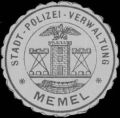Search results
Jump to navigation
Jump to search
Page title matches
- Image of Lithuanian wax, metal or other seals, or drawings thereof. [[Category:Seals]]1 member (0 subcategories, 1 file) - 11:16, 15 October 2023
Page text matches

File:Klaipedaz2.jpg [[Category:Seals Lithuania]](270 × 265 (14 KB)) - 06:34, 30 August 2015- Image of Lithuanian wax, metal or other seals, or drawings thereof. [[Category:Seals]]1 member (0 subcategories, 1 file) - 11:16, 15 October 2023
- ...est seals showed the head facing the viewer, later 18<sup>th</sup> century seals, showed the face en profil. The present arms are based on the oldest seals and show the head facing the viewer again. The arms were officially granted1 KB (209 words) - 06:54, 24 March 2024
- Radviliškis had no historical seals or arms, hence the arms were newly designed in 1991/2. The city is a main railway junction in Lithuania. The horse is taken as a symbol of strength, but also of transportation. Th797 bytes (107 words) - 06:24, 13 August 2024
- ...om 1939-1945 the area was formally returned to Germany. It was returned to Lithuania in 1945 and called Klaipėda county (apskritis). ...as established. It was abolished in 1953 as well as the other provinces of Lithuania. In 1994 the Klaipėda county was re-established.2 KB (250 words) - 06:54, 24 March 2024
- Palanga is one of Lithuania's oldest settlements, and in the 12<sup>th</sup> century it was an importan There are no historical arms or seals known for the city and the first emblem was designed in 1970. The emblem wa1 KB (221 words) - 06:54, 24 March 2024
- ...s not known whether the arms were granted at either of these occasions. No seals are known from the 16-18<sup>th</sup> century either. ...</sup> century and were finally restored after the renewed independence of Lithuania.1 KB (199 words) - 06:54, 24 March 2024
- The arms were granted on May 11, 1993 and are based on several seals dating from the 18th and early 19<sup>th</sup> century. These seals showed a divided shield with in the upper part the Russian Imperial eagle,1 KB (172 words) - 06:54, 24 March 2024
- ...Visnioveckis. The seal remained in use until the third partition of Poland-Lithuania in 1795. ...thuanians. According to this story one of the Roman tribes that settled in Lithuania was named Ursinai (lat. ursus = bear). If this is true, then it is not clea2 KB (298 words) - 06:15, 13 August 2024
- Later seals all show St. Christopher and Jesus, but the cross gradually is transformed When Lithuania was conquered by Russia in 1795 the arms showed a divided shield with the R2 KB (386 words) - 06:53, 24 March 2024
- Garliava had no historical seals or arms, so the arms were designed in 1994. At request of the local people [[Civic Heraldry Literature - Lithuania|'''Literature''']]: Rimsa, 1998792 bytes (103 words) - 06:54, 24 March 2024
- ...m the seals of the Dukes of Trakai. In the mid 14<sup>th</sup> century the seals of Kestutis and his son Vytautas showed an armoured warrior holding a small [[Civic Heraldry Literature - Lithuania|'''Literature''']]: Rimsa, 19981 KB (205 words) - 06:53, 24 March 2024
- ...received city rights in February 1408 from Grand Duke Vytautas. The oldest seals of Kaunas date from the late 15<sup>th</sup> century and show a shield with ...The cross was probably added by Bona, Queen of Poland and Grand Duchess of Lithuania, who fought against the protestants in her countries. These arms remained i3 KB (447 words) - 06:54, 24 March 2024
- ...s a symbol of Catholicism against Protestantism. The angel was used on the seals of the city until the late 18<sup>th</sup> century. [[Civic Heraldry Literature - Lithuania|'''Literature''']]: Rimsa, 19981 KB (154 words) - 06:54, 24 March 2024
- ...ghts, as it was mentioned as a city in 1792. There are no official arms or seals known for the city until 1935. In 1935 the local council applied to the Pol ...were granted and a new proposal was made after the renewed independence of Lithuania. The local population was in favour for the image of the St. Mary with chil2 KB (332 words) - 11:07, 11 August 2024
- ...econstructed from the text of privilege (picture did not survive) and from seals of the 17th-18th centuries. [[Civic Heraldry Literature - Lithuania|'''Literature''']]: Rimsa, 19981 KB (176 words) - 06:53, 24 March 2024
- ...6, the self-administration of the town continued the use of the unicorn on seals (the evidence is known from 1785, 1789, 1790) and restored the arms formall [[Civic Heraldry Literature - Lithuania|'''Literature''']]: Rimsa, 20041 KB (185 words) - 06:54, 24 March 2024
- The district used the seals with National Arms. Their design was copied from the State minor seal but s When the Republic of Lithuania has established the Panevezys municipality, it modified the arms: instead o4 KB (687 words) - 06:53, 24 March 2024
- Initially, the National Arms were used on seals, and the [[Samogitia]]n bear should appear in late 18th century, though the [[Civic Heraldry Literature - Lithuania|'''Literature''']]: Information and image provided by Virginijus Misiunas,2 KB (387 words) - 06:54, 24 March 2024
- ...s; for Netherlands personal arms, arms of water boards; for Danzig, flags, seals and personal arms </h6> | Lithuania ||Poland, Germany8 KB (1,108 words) - 06:44, 26 August 2024